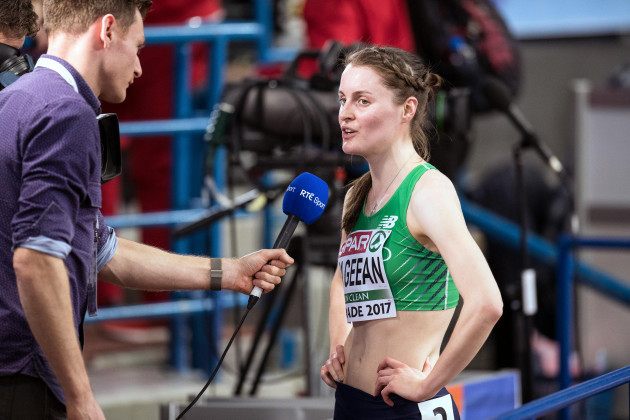DAVID GILLICK KNOWS how they all feel when he holds the microphone under their chin.
If they’re smiling, he can relate to their happiness, and if there are tears pooling in their eyes, he knows why. Whatever the emotion, he has experienced what they’re experiencing now. Up until his retirement from athletics in 2014, Gillick was on the other end of that exchange, panting his way through the questions.
In his running career, the 400m specialist became a European indoor champion in 2005 and 2007, as well as a world indoor bronze medalist in 2004. His role in athletics now is that of a trackside reporter for RTÉ Sport. He’s typically the first person that the Irish athletes see after their event. In times of triumph and despair.
Thankfully, most of the interviews with Gillick at the European Athletics Championships were conducted in happy circumstances. Ciara Mageean [1,500m] and Mark English [800m] had smiles stretched across their faces after winning a silver and bronze medal respectively. Israel Olatunde elevated himself to a new level of distinction when he broke the national record after becoming the first Irish athlete to run in the 100m final at the European Championships.
But when an athlete comes up to Gillick weighed down by disappointment or the shortcomings of a performance that promised more, he knows he has to prepare for a different kind of conversation on camera.
“I’m thinking about how I’m going to approach it,” Gillick explains to The42 about his job as part of the athletics coverage.
“People at home watching the athletics are just watching pictures. They just want to understand what’s going on on the screen.
“I’m also looking at the athlete and saying, ‘Ok, I know this person, I’ve gone through it,’ so you have time to just manage their emotions as well. Body language tells you everything. I’m not going to be that difficult person post-race. I’m not trying to look for tears. I want them to talk to the nation, they’re not talking to me.
“I want them to almost tell their story a little bit. And that all sounds great, but you only have two or three minutes to get it done. That’s the pressure side of working in that kind of space.
“Regardless of how you do, there’s a lot of people that love you and who empathise with you, and have helped you on their journey. It’s not about talking to me, or RTÉ, it’s talking to the people you know at home. That’s the mindset that I always talk about to them”
“I want athletics to be at the forefront of sports media and I want people to really watch it and get to know these people because they put so much into it. We don’t hear much about it and we don’t see them from one end of the year to the next, so it’s trying to get them to just talk.
“It went well for me this week and I feel embarrassed that people are saying well done to me. At the end of the day, it’s the athletes who are talking. They’re the ones who have to come up and have a microphone in their face and have the camera.
“It’s all smiles and happy when the going is good, and it was positive this week, but there were a few tough interviews for athletes [after a race] where it didn’t go well. They’re trying to get their head around that about 60 seconds after crossing the line.”
Despite not reaching the podium in their events, two athletes who offered particularly engaging interviews were Sarah Lavin after the final of the 100m hurdles, and steeplechaser Michelle Finn. While sharing in their disappointment, Gillick was happy to see Lavin articulate some of her ambitious personality to the nation, and for Finn to allow people see the “stillness” in her character that’s at the foundation of her athletic ability.
An ebullient Sarah Lavin analyses her performance in 100m hurdles final at the European Athletics Championships, where she finished fifth. pic.twitter.com/Y12HxfmrIx
— RTÉ Sport (@RTEsport) August 21, 2022
Sometimes an athlete is too overwhelmed to speak, and Gillick can sense the pain in them. To show compassion, he gives them a pardon from the media obligations rather than press an interview on them that will only worsen their state.
“There’s been one or two times, and even last week, there was one particular athlete who was absolutely shattered,” says Gillick.
“They wanted to talk but they just weren’t able to speak and I just said, ‘Look, go on, you’re grand.’ Some athletes were upset and I could clearly see that they didn’t want to talk. I can understand that, and in those circumstances, I just tell them that I’ll keep it to one question and that’s it.”
Team Ireland concluded this campaign with 14 top-10 finishes as well as some encouraging PB and national record times. With the 2024 Olympics on the horizon, those numbers bode well for Ireland’s prospects. But the main message that has derived from the European Championships is the need for more funding in athletics, particularly for coaches who don’t have financial support.
Athletics journalist Cathal Dennehy outlined what is required in a well-written open letter to Minister for Sport Jack Chambers in the Irish Independent on Sunday. Gillick will happily add his voice to that appeal.
“I know Cathal very well and I thought his article was nail on the head, and spot on. I saw Minister Chambers out there in Munich and I saw what he was tweeting and he was loving it. So, you’re going, ‘Right, now we have an opportunity. You’ve seen first hand how good our sport can be.
I’ve trained in different countries and I’ve seen the resources that go into athletics in these countries. When you get to the start line, it’s not a level playing field [with the other athletes], particularly coaching.
“We’ve harped on about this narrative for a long time, and I think what’s great about Munich is we got coverage. And why did we get coverage? Well, there was no GAA and there was space. We probably got more than we bargained for in terms of our sport hitting the headlines which is fantastic. But it’s [about] what happens next. Facilities are there and our athletes are individually funded, but the fundamental thing in the world of athletics is coaching.
If we’re not able to fund our coaches and make sure that they have good opportunities themselves, well then it’s not sustainable.
“I know a lot of these coaches and they’re essentially volunteers. They’ve got jobs, families, mortgages, kids and a lot of them would have flown back on Sunday and were straight back into work today. That’s their reality. If we’re really going to support our athletes, we need to have that circle around them that’s robust, sustainable and ensure that there’s opportunities for our coaches.”
Originally published at 19.14
The42 is on Instagram! Tap the button below on your phone to follow us!

